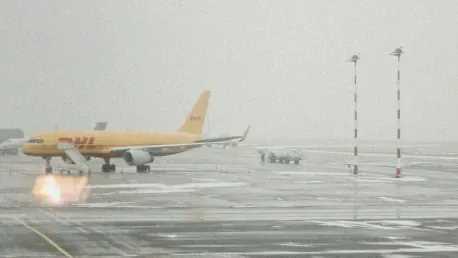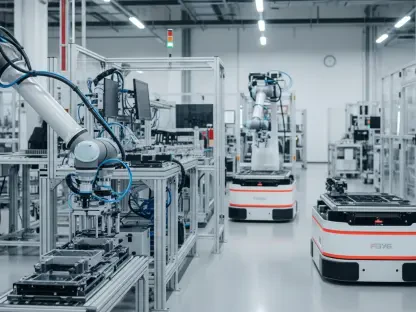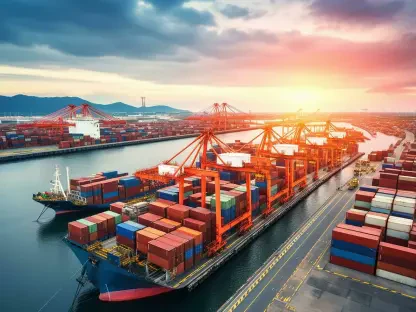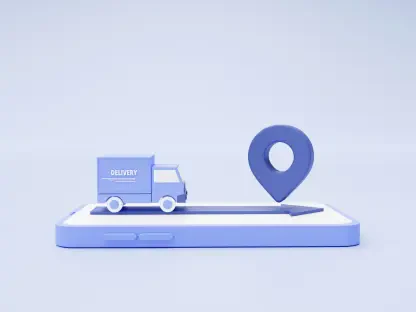In today’s dynamic economy, efficient and reliable air freight forwarding services have become increasingly important, especially within burgeoning markets such as India’s. With Bangalore at its technological and industrial center, this city has emerged as a critical hub for air freight forwarding. The rapid growth of both its industrial infrastructure and logistics network has created a demand for sophisticated air forwarding services that ensure the smooth movement of goods across borders. This article delves into the top five air freight forwarders in Bangalore, offering insights into their services and the innovative strategies they employ. Beyond examining these key players, the article also explores how technology and sustainable practices are reshaping the air freight forwarding landscape in the region.
Leading Air Freight Forwarders in Bangalore
DHL Global Forwarding
DHL Global Forwarding leverages a comprehensive logistics network to offer air, land, and sea freight services. Known for its quality assurance, the company also provides supply chain solutions, temperature-controlled logistics, project management, and oversized cargo shipping. This versatility allows DHL to cater to a wide array of client needs and maintain a robust presence in Bangalore’s air freight sector. The company’s emphasis on technology aids in improving efficiency. Real-time tracking systems and automated documentation processes minimize human error and expedite the movement of goods. Additionally, DHL invests in route optimization software to reduce delivery times and operational costs, fortifying its standing as a preferred freight forwarder.
DHL Global Forwarding stands out not just for its extensive service offerings but for its commitment to innovation within the logistics industry. Their suite of technological tools extends to predictive analytics powered by AI, enabling the company to forecast demand and adjust its resources accordingly. By incorporating blockchain technology, DHL ensures transparency in transactions and supply chain integrity, minimizing the risk of fraud. The firm’s investment in renewable energy-powered facilities further demonstrates its commitment to sustainability, making it a preferred choice for eco-conscious clients. Through these cutting-edge practices, DHL Global Forwarding not only enhances operational efficiency but also sets new benchmarks in the industry.
Kuehne + Nagel
This Swiss-based logistics giant provides end-to-end supply chain solutions with a presence in over 100 countries. Their suite of services includes air cargo, sea freight, over-the-land transportation, customs clearance, warehousing, integrated logistics, and distribution. Collaborations with companies like Shiprocket and Clutch enhance their offerings, creating a seamless logistics experience for clients. Kuehne + Nagel’s strategic use of technology further streamlines their operations. Warehouse management systems, real-time tracking, and electronic documentation ensure that shipments are managed efficiently and accurately. By continually embracing technological advancements, they maintain a competitive edge in Bangalore’s bustling market.
Kuehne + Nagel is also renowned for its focus on digital freight management solutions. By leveraging cloud-based platforms, the company facilitates real-time collaboration and informed decision-making among its stakeholders. The firm’s extensive use of IoT devices within its logistics network provides granular visibility into shipment conditions, ensuring that goods are transported under optimal conditions. Additionally, Kuehne + Nagel’s robust data analytics capabilities enable them to analyze vast sets of operational data, thereby optimizing resource allocation and enhancing service quality. With a strong focus on innovation and customer-centric solutions, Kuehne + Nagel continues to be a dominant force in Bangalore’s air freight forwarding sector.
Streamlining Operations with Advanced Technology
Real-Time Tracking and Automated Documentation
Utilizing advanced tracking systems such as GPS, RFID, and IoT devices, air freight forwarders can monitor shipments in real-time. This transparency helps prevent delays and ensures that customers are constantly informed about their cargo’s status. As these systems evolve, they become integral to maintaining efficient operations. Automated documentation tools further enhance efficiency. Systems that manage customs, invoices, and labels automatically reduce processing times and minimize the occurrence of human errors. By streamlining these administrative tasks, forwarders can focus on improving other aspects of their service offerings.
The integration of real-time tracking systems and automated documentation is revolutionizing the air freight industry. These technologies allow for seamless monitoring and management of shipments, providing a higher level of transparency and reliability. IoT devices attached to cargo offer real-time updates on location and condition, allowing for immediate corrective actions if necessary. Automated documentation systems, such as Electronic Data Interchange (EDI), significantly cut down on paperwork, reducing both errors and labor costs. With these systems in place, air freight forwarders are able to offer more streamlined, efficient, and customer-friendly services, leading to increased client satisfaction and loyalty.
Route Optimization and Customs Assistance
Efficient route planning is crucial for timely deliveries and cost reduction. Air freight forwarders employ sophisticated software to analyze various factors, such as fuel costs, delivery deadlines, and traffic conditions, to determine the best routes for shipments. This not only ensures timely deliveries but also contributes to lower operational costs. Customs procedures can often be complex and time-consuming. Air freight forwarders in Bangalore provide expert support for customs documentation and formalities, significantly reducing potential delays. Their understanding of local and international regulations ensures smooth transit across borders, fostering more efficient logistics operations.
The efficacy of route optimization and customs assistance cannot be overstated in the modern logistics landscape. Advanced software tools enable air freight forwarders to preemptively address potential snags in the supply chain, optimizing routes for both time and cost efficiency. These tools incorporate machine learning algorithms to constantly adapt and fine-tune routes based on real-time data, further enhancing operational efficiency. Simultaneously, expert customs assistance mitigates risks associated with regulatory compliance, ensuring that shipments are cleared without unnecessary delays. This dual focus on optimized routing and customs efficiency allows air freight forwarders in Bangalore to offer a comprehensive service package that meets the high demands of global trade.
Sustainable Practices in Air Freight Forwarding
Efficient Aircraft Routing and Investment
With the growing emphasis on sustainability, air freight forwarders in Bangalore are adopting practices that reduce environmental impact. Optimizing flight routes to lower fuel consumption and emissions is one such strategy. Forwarders use advanced algorithms and real-time data to plan the most efficient routes. Investing in modern, fuel-efficient aircraft is another significant step toward sustainability. These aircraft emit fewer greenhouse gases, contributing to a lower environmental footprint. By integrating these innovations, forwarders not only enhance their environmental credentials but also appeal to eco-conscious clients.
Investment in efficient aircraft routing and fuel-efficient technology represents a significant leap toward sustainable air freight operations. Algorithms that optimize air routes incorporate variables such as weather patterns, air traffic data, and fuel prices, providing the most efficient flight paths that minimize fuel consumption. Moreover, the deployment of next-generation aircraft, designed to be highly fuel-efficient and emit fewer greenhouse gases, further underscores the commitment of air freight forwarders to sustainability. These efforts not only contribute significantly to reducing the carbon footprint of air freight operations but also present a compelling value proposition for clients prioritizing sustainable supply chain solutions.
Sustainable Packaging and Energy-Efficient Facilities
The use of sustainable packaging materials, such as biodegradable, recyclable, or reusable options, is gaining traction. These materials reduce waste and lessen the environmental impact of shipping activities. Energy-efficient facilities also play a role in sustainable logistics. Warehouses and distribution centers equipped with energy-saving lighting, heating, and cooling systems help reduce overall energy consumption. By incorporating these green technologies, air freight forwarders make meaningful contributions to environmental sustainability.
In addition to sustainable packaging, air freight forwarders are turning their attention toward making warehousing and ancillary facilities more eco-friendly. Advanced energy management systems and the use of renewable energy sources, such as solar and wind power, are becoming commonplace in modern logistics hubs. These energy-efficient facilities not only reduce the carbon footprint but also result in significant operational cost savings over time. The adoption of green building practices, like the use of skylights to reduce lighting needs and energy-efficient HVAC systems, further underlines the sustainable initiatives undertaken by forwarders. By focusing on both sustainable packaging and energy-efficient facilities, forwarders are setting new standards for eco-friendly logistics operations in Bangalore.
The Role of Technology in Enhancing Efficiency
Warehouse Management and Data Analytics
Modern warehouse management systems incorporate automated tracking and management capabilities. These systems ensure the efficient storage, retrieval, and dispatch of goods, minimizing delays and improving overall operational efficiency. Data analytics play a crucial role in identifying inefficiencies and areas for improvement. By analyzing performance indicators, forwarders can make data-driven decisions that enhance their service offerings. This focus on continuous improvement helps maintain high standards in a competitive market. Warehouse automation employing robotics and AI is also being adopted, allowing for faster and more accurate operations.
Incorporating advanced technology in warehouse management and data analytics allows air freight forwarders to streamline their operations significantly. Automated warehouse management systems ensure seamless inventory control, reduce errors in order fulfillment, and optimize storage space utilization. Data analytics offer invaluable insights by interpreting vast quantities of data collected throughout the logistics process. This allows forwarders to identify bottlenecks, forecast demand more reliably, and optimize resource allocation. Additionally, adopting robotics for tasks such as sorting, picking, and packing enhances operational speed and precision, leading to heightened efficiency. These technological advancements enable forwarders to deliver superior service quality, reinforcing their market position.
Blockchain Technology and Emission Tracking
Blockchain technology offers secure and transparent transaction management, bolstering supply chain integrity and reducing the risk of fraud. This technology ensures that all parties have access to the same data, enhancing trust and accountability in the logistics process. Additionally, emission tracking technologies are becoming vital in air freight forwarding. They aid in tracking carbon emissions, supporting sustainable decision-making and carbon offset programs. These technologies help forwarders adhere to regulatory requirements and improve their sustainability profiles.
Blockchain technology is set to revolutionize the logistics industry by providing an immutable, transparent ledger of transactions that can be accessed by all involved parties. This transparency significantly reduces the risk of discrepancies and fraud, ensuring an unparalleled level of trust and integrity in the supply chain. Meanwhile, emission tracking technologies enable air freight forwarders to monitor and record their carbon footprint accurately. Sophisticated sensor systems and analytical tools measure emissions from various logistics activities, offering insights into areas for improvement. By adhering to stringent environmental standards, forwarders can not only meet regulatory requirements but also appeal to increasingly eco-conscious clients, boosting their reputation as sustainable logistics providers.
Conclusion
DHL Global Forwarding utilizes an expansive logistics network to deliver air, land, and sea freight services. Renowned for quality assurance, it also offers supply chain solutions, temperature-controlled logistics, project management, and oversized cargo shipping. This versatility enables DHL to meet diverse client needs and maintain a strong foothold in Bangalore’s air freight sector. The company’s focus on technology boosts efficiency, with real-time tracking systems and automated documentation reducing human error and speeding up goods movement. DHL also invests in route optimization software to cut delivery times and operational costs, bolstering its reputation as a top choice for freight forwarding.
Beyond its wide range of services, DHL Global Forwarding excels through its dedication to innovation. Its technological toolkit includes AI-powered predictive analytics, which helps forecast demand and allocate resources efficiently. Blockchain technology enhances transparency and integrity within the supply chain, drastically reducing fraud risks. Moreover, DHL’s commitment to sustainability is evident through its renewable energy-powered facilities, appealing to eco-conscious customers. These practices not only improve operational efficiency but also set new industry standards, making DHL Global Forwarding a leader in logistics and a preferred partner for clients worldwide.









